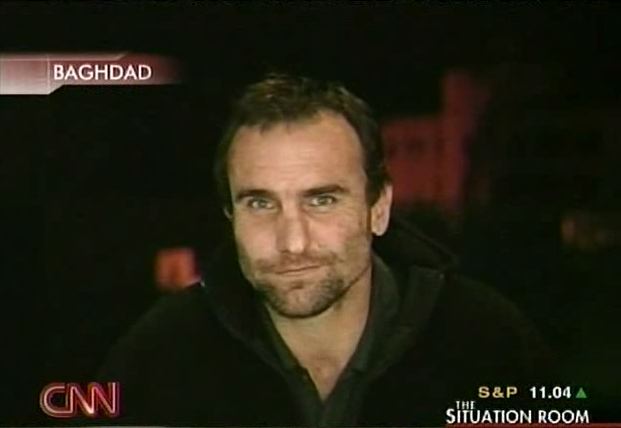TSR: "Certainly none of them are short of weapons."

Click photo to play
Length: 5:00
WOLF BLITZER: Iran's Revolutionary Guards became targets today. A car packed with explosives blew up near a bus carrying members of that elite force. State media say 11 people were killed, 31 were wounded. The attack took place in a lawless area near the Pakistani border.
A militant group tied to al Qaeda reportedly claimed responsibility. Government officials blame insurgents and drug traffickers for that attack.
Iraq's neighbors are upping the ante in a high stakes effort to shape the future of the region.
But are they fighting a war by proxy?
And joining us now, our correspondent in Baghdad, Michael Ware -- Michael, we've heard a lot about Iranian influence in Iraq.
But what about the Saudis? What are they up to?
There have been reports the Saudis are shipping truckloads of cash into the Al-Anbar Province, to funnel some of that money to the Sunnis.
What's going on?
MICHAEL WARE, CNN CORRESPONDENT: Well, Wolf, as the Iraqi prime minister, Nouri Al-Maliki, himself pointed out, essentially everyone in this region has a stake in the game that is called the war in Iraq. And that includes Saudi Arabia.
Now, Saudi Arabia, like most of the Sunni Arab states, which just so happen to be America's allies, warned before the invasion and in the immediate aftermath and at every possible opportunity since about the rise of Iranian-backed expansion.
Now, we've come to see that come to pass.
So what we're now seeing is the Saudi government in a difficult position. It needs to protect its interests without betraying the American alliance.
We're seeing it fund Sunni tribes because, don't forget, there is a massive land border that Saudi Arabia shares. And these tribal allegiances cross that border, which to them mean nothing.
Don't forget, also, there's a lot of Gulf Oil money -- not coming from the governments, but from rich donors -- that is going to al Qaeda. Much of the money that went to Osama bin Laden now goes to Al Qaeda In Iraq.
These donors want to see their money at work and they believe they see that in the Jihad here in Iraq.
Saudi Arabia hosts the Baath Party, essentially. It launders and filters their money through its financial system.
So there's all sorts of money pouring in here, not just Iranian.
BLITZER: Is some of that money, the end result of it being the death of American troops?
WARE: Well, by and large that's the point of it, Wolf. I mean some of the money that's being outlayed -- and, of course, I stress as far as we're aware, none of it is official. This is not governments acting overtly. This is all private and behind the scenes.
But some of it is strategic. It's to shore up friendly sheikhs. It's to secure power bases. It's to maintain alliances. But then again, a lot of it is to arm the fight.
Now, that fight used to be solely against the American forces and, to a lesser degree, the Brits. But now it also includes funding the civil war. And I've got to tell you, nationalists, Baathists, Jihadi, al Qaeda -- it's hard for me to find a Sunni insurgent group that is short of cash. Certainly none of them are short of weapons -- Wolf.
BLITZER: Button up for us, Michael, the Muqtada al-Sadr story. U.S. officials insist he's now in Iran, that he's left Iraq. You've covered this guy for a long time.
Is it your sense he's afraid of the United States right now and that's why he may have headed over to Iran?
WARE: I think it's impossible to tell, Wolf.
But Muqtada is not a fellow who has shown any great fear of the U.S. military. Don't forget, his forces engaged the might of the U.S. Army at least three times in 2004. And at best, you've got to say it came out a draw. It certainly made him into the, you know, folkloric superhero that he is today.
And there's a lot of buffers between him and the U.S. military. And, of course, he's got a lot of Iranian friends. We've heard President Bush talk about the Quds force. Well, the Quds force have their talons into Muqtada, as well, not quite as much as they have into other groups, but Muqtada receives Iranian support as much as anyone else.
The fact that, is he in the country or out of the country?
Honestly, we can't answer that. Muqtada himself will have to answer that when he finally pops up.
But he's gone to Iran many, many times. It doesn't mean that he's taken flight. And, indeed, if he has taken flight, most likely it's to get away from internal Shia militia rivals.
BLITZER: Michael Ware reporting for us from Baghdad.
Michael, thanks.
WARE: Thank you, Wolf.
